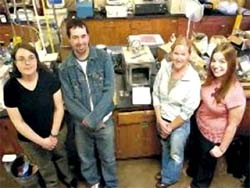'Clean' Polime made from ... irritable!
Fabrication of polymer resin from alcohol (scale) of alcohol after the process of wine making . Scientists acknowledge that this invention is highly economical, contributing to environmental protection. But this is the invention of a group of students.
A group of students at Oregon State University (OSU) have built an environmentally friendly polymer by mixing products from the process of making alcohol and biodiesel production. They are students Christen Glarborg, Patrick O'Connor, Heather Paris and Alana Warner-Tuhy.
They have created a new material from alcoholic acid, a product in the production of alcohol and glycerin in biodiesel production technology. When mixed together, these ingredients can create hard foam polymers - according to H. Paris, a member of the team.

From left to right: Christen Glarborg, Patrick O'Connor, Heather Paris and Alana Warner-Tuhy (Photo: ScienceDaily / Cory Reed)
And P. O'Connor, another member of the group, recounted the process of coming to the invention: "At first, this new material was washed out in the country. After that, Dr. Hackleman suggested we try cast it into a tray like foam trays sold in supermarkets'.
However, their initial test results were just as hard as if sugar candy was cooked so long that it got stuck and you had to throw the pot away.
These young researchers persisted until they could make a glue that could be used as they wanted. They decided to mix other products such as sawdust and they created a moldable material although still slightly sticky. So they put it in the fire to see if it was solid and they succeeded. It seems that they can become pressed boards for ' green ' houses.
'Then we found our polymer evaporated at 6000C,' Paris said. 'So we also thought about making ashless sticks or sticks'.
David Hackleman, chairman of Linus Pauling's agency at the Oregon State Technical University (OSU), said the new production process is unique and has economic potential. Moreover, it also takes advantage of both glycerin, a byproduct of biodiesel production.
Group of students registered patent rights. The new material they create can replace polyester foam in a wide range of products, from food trays to tables and chairs, pressed wood, firewood, insulators and even hair spray gel. .
The group won the title of 'Best Chemical Engineering Project' - the People's Choice Award 's best chemical engineering and leaderboard - the Popular Choice Award at the annual technical exhibition held eighth of Oregon State University (OSU).
These young inventors are currently experimenting and refining this polymer to enhance their superiority.
Minh Minh
- Distinguish clean pork and worm meat
- Distinguish clean vermicelli and vermiculite
- Video: Cure brain tumors by sentence cancer cells
- Prolonged insomnia will affect the mood
- Clean water tower
- Clean food and fuel, which one?
- Are we living too clean?
- Carbonated water causes aggression in children
- Clean water and numbers to speak
- Lack of sleep easily irritated
- Clean gas stove 'Made in Vietnam' environment
- Asphalt Polime: Why not?
 Why do potatoes have eyes?
Why do potatoes have eyes? 'Tragedy' the world's largest carnivorous life: Death becomes ... public toilet
'Tragedy' the world's largest carnivorous life: Death becomes ... public toilet Tomatoes were once considered 'poisonous' for 200 years
Tomatoes were once considered 'poisonous' for 200 years Detecting microscopic parasites on human face
Detecting microscopic parasites on human face